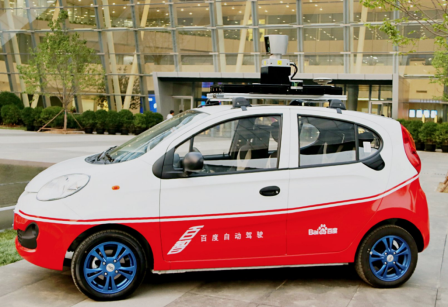Baidu unveils its own all-electric self-driving car
Baidu unveils its own all-electric self-driving car1

Baidu plans to swap the modified BMW 3-series that its been using since the start of its self-driving tests for a modified Chery EQ, a small four-door hatchback manufactured in China.
The fully-electric car has already entered the fleet, according to a Baidu spokesperson speaking to Business Insider. Not much else is known about the agreement and modifications, if any, that Baidu has made.
See Also: Hyundai joins start line at Willow Run self-driving test track
The Chery EQ has a range of 120 miles and costs 59,800 RMB ($ 9,000), cheap enough for Baidu to order thousands for its fleet. In photos, the Chery EQ has a new Baidu coat of paint and a sensor tower on the roof.
Baidu wants to have a shuttle service online in China by 2018. The Chery EQ could be the perfect vehicle for this type of driverless shuttle, since its small, silent, and can last for a few journeys before needing a refill.
The Chinese search giant, often called the “Google of China,” has been working on self-driving for a few years now. The project ramped up in the past 12 months, with Baidu opening R&D centers in the United States and announcing plans to have driverless cars on the road in 2018.
That timeframe collides with nuTonomy, a shuttle service in Singapore that wants to launch in 2018. Uber has also signalled plans to start adding driverless cars into its Pittsburgh fleet.
Baidu a key China market player
Shuttle and ride-hailing services could be the future of the automotive industry, as I’ve wrote previously, and Baidu is going to be a key player in the Chinese market. Didi Chuxing will most likely be Baidu’s main competitor.
Didi is a formidable opponent, it is backed by Baidu’s two main internet competitors, Alibaba and Tencent, and recently acquired Uber China. It has the ride-hailing market locked down in China, with 95 percent (including Uber China) of rides processed by its services.
Baidu invested $ 1 billion into Uber earlier this year, but that investment has soured with the acquisition of Uber China by Didi. Baidu now finds itself alone against a giant that can seemingly raise billions whenever it needs cash, and its shuttle service isn’t even online.
It could turn the tide with an early launch of its shuttle service, before Didi has its own self-driving cars on the road. The question is whether Chinese consumers will adopt Baidu’s platform, or if they will wait for a few years to figure out the safety of self-driving.
The post Baidu unveils its own all-electric self-driving car appeared first on ReadWrite.
(20)


